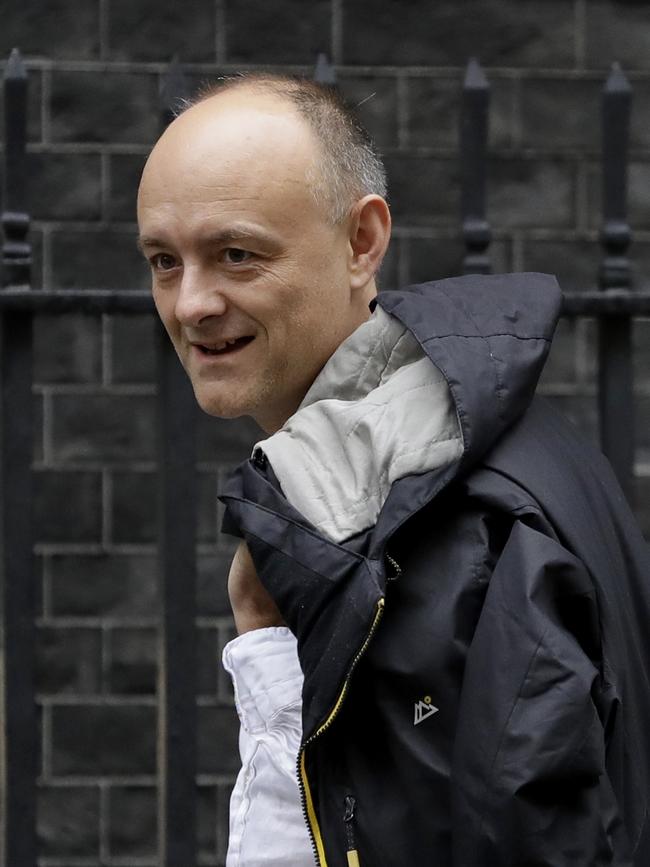Boris Johnson needs to turn on charm amid toxic state of affairs
The pugnacious British PM needs to turn on the charm offensive.

In a week when Boris Johnson’s trip to the US was disrupted by questions about his friendship with a younger woman and curtailed by a defeat in the UK Supreme Court, seeking to shore up his position by comparing him to Bill Clinton sounds like a bold idea.
But on Friday evening — after arguably the most toxic week in modern British politics — Johnson’s senior sidekick, Dominic Cummings, told ministerial aides that No 10 would respond as Clinton did during the greatest crisis of his presidency.
“We need to be like Clinton when the Monica Lewinsky stuff was flaring up,” Cummings said. “He ignored the Washington Beltway bullshit and just went around the country talking to people about their concerns. He ended up with higher approval ratings than when he first became president.”
Then again, Johnson’s critics might point out Clinton did not use taxpayers’ money to help Lewinsky’s career, as Johnson has with his close friend, US tech entrepreneur Jennifer Arcuri.
On Sunday, Johnson headed to the Conservative Party conference in Manchester, where he plans a series of visits to highlight government spending on the National Health Service, police and schools in addition to his big speech on Wednesday, a general election campaign in all but name.
Behind the scenes, though, the Prime Minister leads a cabinet chastened by the UK Supreme Court rebuke and the backlash in parliament against the tough language Cummings has urged Johnson to employ, language that sparked claims on Wednesday that his inspiration is not Clinton but Donald Trump. And even as he prepares to set out his plans, in parliament the opposition is in talks that could lead to Johnson facing the same fate as both of those presidents — a motion to impeach him.
Surprise defeat
Ministerial confidence that the government’s five-week suspension of parliament would be ruled legal was eroded as the case went on at the Supreme Court.
Attorney-General Geoffrey Cox had told Johnson it was legal and constitutional, a view reinforced by the Lord Chief Justice in the High Court. But as “the supremes” questioned the government’s lawyers, it became clear they were troubled that ministers had submitted no sworn statement on why it was necessary to prorogue for such a long time.
“Judges like evidence and we didn’t give them any,” said one minister.
Senior officials, including the cabinet secretary, Sir Mark Sedwill, and Cummings, gathered at 10.30am on Tuesday with Cox, no-deal Brexit minister Michael Gove, and the Lord Chancellor, Robert Buckland, to watch the result. If defeat, by then, was not a surprise, the manner of it was “a jaw-dropper”, said a senior figure.
Not only was the 11-0 result a humiliation for the government, the court had rewritten constitutional convention outlined in the 1688 Bill of Rights.
Johnson, in touch by phone from New York, where he was at the UN General Assembly, was “furious” and had to be talked down from denouncing the court. Cox and Buckland said he could contest the verdict, but without impugning the judges’ motives.
Several ministers, with Buckland the most outspoken, made the same points on a cabinet conference call. But Jacob Rees-Mogg, the leader of the Commons, voiced the view of many Brexiteers that a “constitutional coup” had occurred. Even Johnson was “seriously pissed off” by this contribution. The PM flew home overnight as parliament resumed.
After a day of statements, he finally got to his feet, in a bad-tempered Commons, at 6.30pm, to a chorus of cries to “resign”.
Johnson succeeded in rallying the Tory benches with a rambunctious speech that challenged Labour to support a general election and repeatedly attacked his critics for supporting the Benn Act to outlaw a no-deal Brexit, which he branded the “surrender act”.
As the questions began, Johnson came unstuck under hostile questioning from the Labour MP Paula Sherriff, who denounced his “offensive, dangerous and inflammatory” language, referring to the murder of Jo Cox during the EU referendum campaign. “Many of us in this place are subject to death threats and abuse every single day. They often quote his words — surrender act, betrayal, traitor — and I, for one, am sick of it.”
Johnson responded: “I have to say that I have never heard such humbug in all my life,” prompting cries of “shame” from the benches opposite. “He was tired,” said a colleague. “He (Speaker John Bercow) kept him there for two hours when he had rushed back on the red eye.”
No surrender
Whatever their cause, Johnson’s words sparked a firestorm. Jo Swinson, the Liberal Democrat leader, denounced the “disgraceful state of affairs”, telling MPs: “Today, I have reported to the police a threat against my child.”
The moorings of (often faux) civility that govern parliament had been cut. When the House met on Thursday, Bercow said the “toxic” atmosphere was the worst he had known in 22 years.
Publicly, Johnson and Cummings were unrepentant, arguing that the Benn Act, which mandates the government to seek a three-month extension to the October 31 Brexit deadline if Johnson does not get a new deal with Brussels by October 19, surrenders powers to Brussels.
Privately, Johnson acknowledged he had made a mistake, telling the political cabinet on Thursday that his “humbug” comment referred to the attacks on his use of “surrender act”, not the comment on Jo Cox. When Liz Truss, the international trade secretary, told him: “You’ve got to say what you like,” he demurred: “No, it’s right what people are saying.”
A minister said: “Boris acknowledged he’s got a job to do with female colleagues. At the end he said, ‘I should not have said humbug, it was a mistake’. He meant it about the surrender act.”

Cummings, vilified for persuading Johnson to pursue a divisive political strategy, was less repentant, taking up residence in parliament’s Portcullis House, where he was confronted by furious MPs. When Labour’s Karl Turner said he had had “death threats overnight”, Cummings replied: “Get Brexit done,” adding: “I don’t know who you are.”
At a book launch on Thursday evening, he goaded his critics, saying: “We are enjoying this, we are going to leave and we are going to win”, warning those who want to delay or stop Brexit that they are “disconnected” from what people think “in the real world”.
Privately, Cummings was delighted by the fuss over “surrender act”, comparing it to “bubble blindness” over the claim on the side of the Vote Leave battle bus that backing Brexit would lead to an extra £350m a week for the NHS — which got most of its publicity when opponents complained about its veracity.
“Remain MPs keep babbling about the surrender act,” he texted a friend. “Reminds me of the good old days with £350m.”
In Friday’s meeting with ministerial aides, Cummings doubled down, calling parliament “a disgrace” and saying Johnson would use “surrender bill every day” and “ram it down their throats”.
Ministerial concern
Ministers fear Cummings has broken the first rule of being a successful adviser: Do not become the story yourself. But some think he is deliberately pursuing a “Mourinho strategy”, making himself a lightning rod to divert criticism from Johnson.
“When Jose Mourinho was manager of Chelsea every press conference was all about the manager,” said one aide. “The players said that took the pressure off them and let them get on with their game. That’s how we feel.”
If they are wary of the man, most ministers are on board with his strategy for winning a general election. At political cabinet Gove, Johnson’s one-time leadership rival, said: “Lots of us are giving you advice, Prime Minister, but as I know you’re quite good at winning elections.”
At the same meeting, Isaac Levido, a protege of political strategist Sir Lynton Crosby, who is running Conservative campaign headquarters, outlined plans to “get Brexit done” — the slogan that will adorn the Tory conference this week — and then “deliver the people’s priorities”.

He presented evidence that the Tories have a shot at winning a majority with a 50-50 strategy of defending 50 vulnerable seats and attacking 50 more.
The Tories’ private polling shows they have retained 70 per cent of their 2017 voters, while Labour has held on to just 51 per cent of those who supported Jeremy Corbyn two years ago.
The Tories have lost 17 per cent to the Brexit party and 11 per cent to the Lib Dems, while Labour has haemorrhaged 28 per cent to the resurgent liberals.
The other elephant in the room was raised by the chief whip, Mark Spencer. “This is all great, but what happens if we don’t leave the EU on October 31?”
Johnson replied: “That’s not a hypothesis we are entertaining. The computer is not programmed.”
No-deal Brexit
Seven cabinet ministers have admitted they have “no idea” what Johnson and Cummings will do if a deal is not secured. Some — including Buckland, Cox, the culture secretary Nicky Morgan, and even the chancellor, Sajid Javid — are prepared to “stage an intervention” and threaten to resign if the Prime Minister flirts with breaking the law.
Attempts to claim that blocking Brexit could lead to riots have been seen as a clue that they hope to use civil contingencies legislation to suspend the Benn Act until after October. But a cabinet minister dismissed this: “That’s used if there is an invasion, a flood or a hurricane. It’s Fantasy Island.”
Former prime minister Sir John Major also claimed last week that the Prime Minister could use “an order of council” to suspend the Benn Act, without input from the Queen.
Privately, cabinet ministers say Johnson, as long as he can argue that he has been compelled to do so by the courts, would be prepared to extend the deadline.
“The focus groups show Boris is not blamed for the problems,” said one MP. “Voters see he is trying.”
Leadership moves
But they are also conscious that that could change. Two cabinet ministers said that Gove, who has twice fought for the leadership, is “on manoeuvres” in case Johnson is forced out.
Gove kept his colleagues back after one meeting to ask their views on Johnson’s expulsion of 21 Tories for voting against the government — a move they believed implied criticism of Johnson’s action. An EU diplomat also claimed Gove had privately signalled that he thinks Johnson would seek an extension if required.
The opposition will not rely on this. Corbyn and the smaller parties will meet on Monday to discuss how they can disrupt Johnson’s conference. The Scottish National Party is pushing hard for a vote of no confidence and the creation of a caretaker government. The Lib Dems and many Labour MPs want a delay until after October 31. Instead, they are discussing plans by Plaid Cymru to launch impeachment proceedings against Johnson.
Once the Tory conference ends on Wednesday, talks with Brussels will intensify. Steve Barclay, the Brexit secretary, is expected to put formal proposals to the European Commission next week, ahead of an EU summit on October 17.
Ministers think this effort is serious, and while the general election strategy looks a bit like a Trump campaign, Johnson will have to channel the charm of Clinton to win over MPs.
A cabinet minister said: “Things have shifted. The PM has realised he needs to be nicer to people who might want to back the deal. The audience for the surrender rhetoric is the country, but the audience that matters now is in the House of Commons.”
The Sunday Times

To join the conversation, please log in. Don't have an account? Register
Join the conversation, you are commenting as Logout